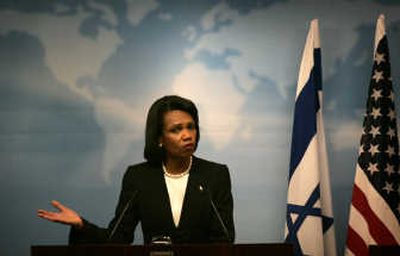Israel calls Gaza a ‘hostile entity’

JERUSALEM – Israel’s security cabinet on Wednesday declared the Gaza Strip a “hostile entity” and said it would begin cutting electricity and fuel supplies to the Hamas-run territory in an effort to stop the constant rocket fire into Israel.
The decision further splits Gaza from the West Bank, the other main territorial component of a future Palestinian state, and holds potentially grave humanitarian consequences for the strip’s roughly 1.5 million residents who rely on imported food, medicine and energy to survive.
It also poses new challenges to the Bush administration’s peace-making efforts, coming on the first day of Secretary of State Condoleezza Rice’s visit here to promote a U.S.-sponsored meeting of Israeli, Palestinian and regional leaders proposed for later this year.
Gaza’s crossings with Israel have been closed for all but emergency aid since Hamas, an armed Islamic movement, seized control of the strip in June after defeating forces from the secular Fatah party. Under the Israeli security cabinet decision, “additional sanctions will be placed on the Hamas regime in order to restrict the passage of various goods to the Gaza Strip and reduce the supply of fuel and electricity.” It did not say when the new sanctions would begin.
In a statement posted on a Hamas Web site, Fawzi Barhoum, a spokesman for the movement, called the Israeli decision “a declaration of full-fledged war on the Gaza Strip.”
Rice, speaking at a joint news conference with Israeli Foreign Minister Tzipi Livni, did not endorse the Israeli move but noted that Hamas is a “hostile entity to the United States as well.”
Livni defended the legality of the government’s decision, saying Israel was not responsible for allowing deliveries to Gaza beyond humanitarian goods. She said Israel was distinguishing between Palestinian moderates, such as Palestinian Authority President Mahmoud Abbas, and extremists.
Rice also met with Olmert and other top Israeli officials to lay groundwork for a U.S.-sponsored peace conference that already is looking shaky.
Her visit, which ends today following meetings in the West Bank with Abbas and Prime Minister Salam Fayyad, was designed to build momentum for the planned regional meeting in Washington.
But top Palestinians and other Arab leaders have been warning that there is little point in attending a conference that doesn’t produce substantive progress toward ending the Israeli-Palestinian conflict.